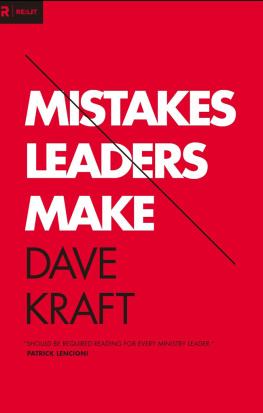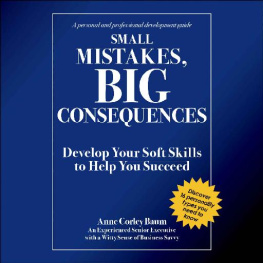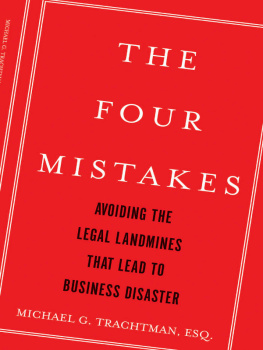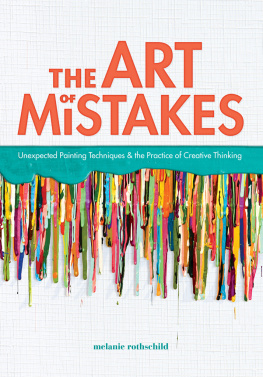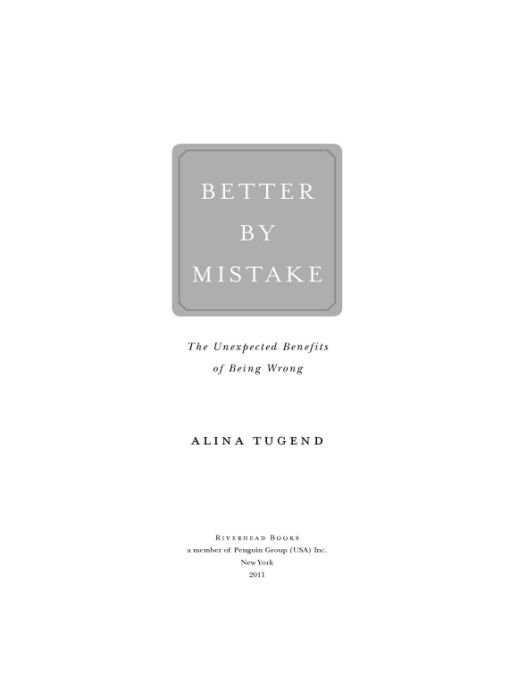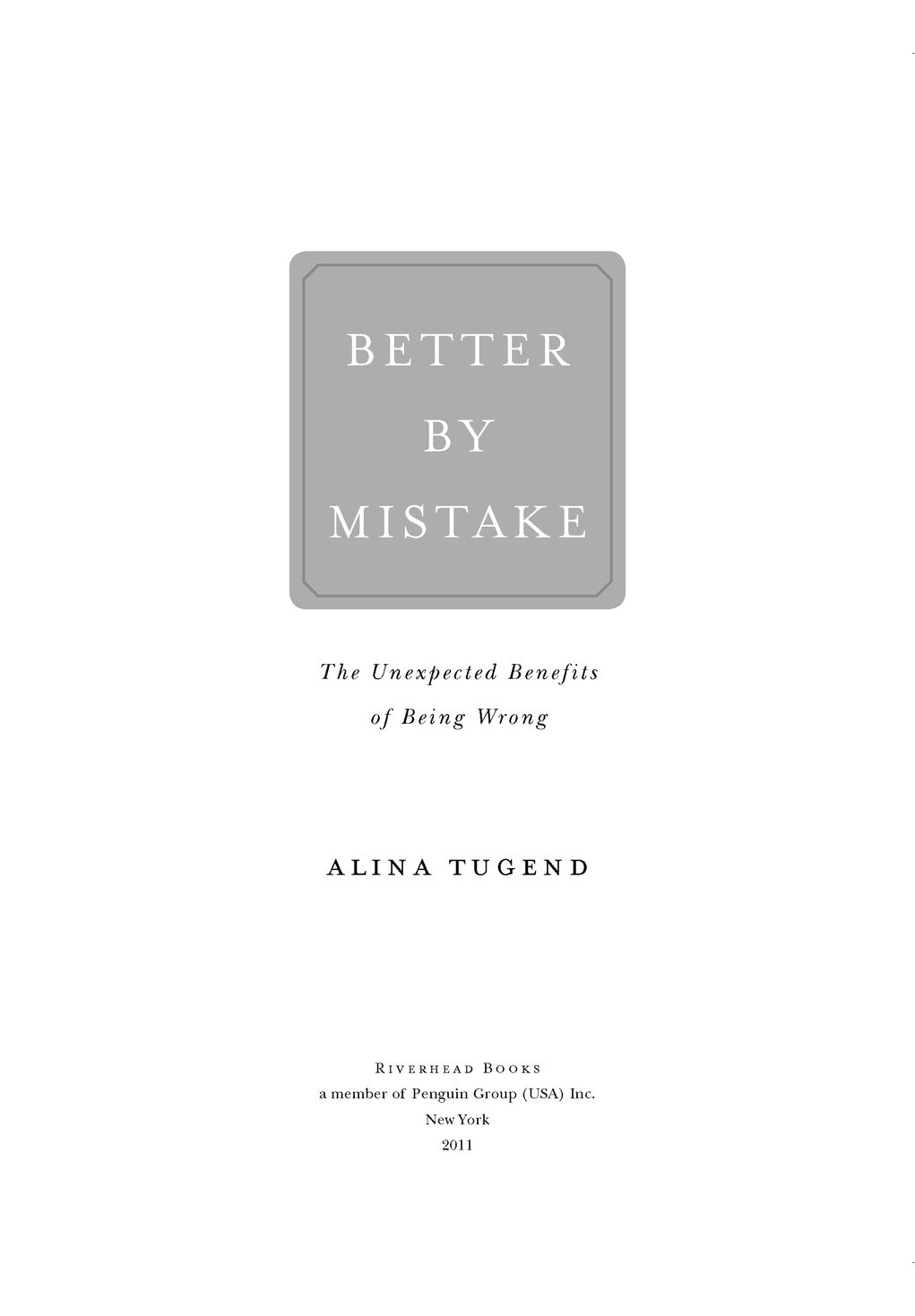Table of Contents
In memory of my grandmother, Irene Tugendreich
In honor of my parents, Tom and Rachel Tugend
With great love to Mark, Ben, and Gabriel
INTRODUCTION
THIS BOOK BEGAN WHEN I MADE A MISTAKE IN A COLUMN for The New York Times. My first instinct, when the minor error was pointed out, was to disown it or cover it up. To rationalize that a correction was not really needed. Then I did what a good journalist should do and told my editor. She graciously acknowledged that she should have caught the error, and we submitted a correction, which ran a few days later. But it bothered me. Not so much the mistake, but the fact that in the world todayin our personal lives, our social interactions, and our workplacesmistakes are viewed as bad. Whatever happened to the platitudes that we hear throughout schoolat least in the first few yearsthat reassure us that we need to make mistakes in order to learn?
A friend of mine loves to tell the anecdote of driving her son home from kindergarten and asking what he learned. Nothing, he said. Nothing? she asked. You didnt learn a single thing? No, he replied. My teacher said you learn by making mistakes, and I didnt make any today. Imagine if that attitude survived throughout our lives. If, when we thought about how our day went, we didnt regret our mistakes, but proudly thought about those we had made and how we had learned from them.
So I wrote a column about the inherent tension between what were toldthat we must make mistakes in order to learn, how all great leaders and inventors have embraced themand the reality that we often get punished for making mistakes and therefore try to avoid themor cover them upas much as possible. I discussed research, which I will expand on in this book, showing how parents and teachers often unwittingly encourage such an error-avoidance mindset and how such children grow into adults who fear and dread making mistakes.
At first glance, this doesnt seem so ominouswhile perhaps we can lighten up a little, in general shouldnt we try to avoid blunders? It depends. Yes, we dont want to make the same error over and over. But that is different from thinking that we not only can but must do everything perfectly, and if we dont, we are failures. Such a mindset creates marriages and relationships where people exert enormous amounts of energy blaming each other when something goes wrong rather than finding a solution. Where defensiveness and accusations take the place of apologies and forgiveness. It creates workplaces where taking chances and being creative while risking failure is subsumed by an ethos of mistake-prevention at the cost of daring and innovation. Or conversely, workplaces where superstars are never challenged; rather, they are rewarded for making really bad decisions. And we end up with a culture where people feel shame at making mistakesbig or littleand pass this shame on to their children.
This topic seems particularly pertinent now. Over the time that I was working on this book, we all watched, astonished, as banking institutions that seemedat least from the outsideas solid as stone imploded, taking the economy down with them. We wondered who was responsible for the wave of home foreclosures, for the job losses, for the uncertainty and anxiety that touched almost all of us. As I write this, a congressional commission is still holding hearings trying to figure out who screwed up, and how. The list of potential suspects is long. But besides the satisfaction of placing blame, will we learn anything from the mistakes that cost so many people so much?
Social psychologists Carol Tavris and Elliot Aronson write in their book Mistakes Were Made (But Not by Me): Most Americans know they are supposed to say, we learn from our mistakes, but deep down, they dont believe it for a minute. They think that mistakes mean you are stupid. Combined with the cultures famous amnesia for anything that happened more than a month ago, this attitude means that people treat mistakes like hot potatoes, eager to get rid of them as fast as possible, even if they have to toss them in someone elses lap. And in this fast-paced world of increasingly complex choices, every decision can seem like a potential mistake. Which phone company, which health plan, which retirement fund? Even advances that in many respects have made lives better, such as medical procedures that prolong the lives of the elderly or fertility options that allow those who once would have been childless to have children, come with a cost. We have more choices, but we also have more opportunities to make the wrong choices, and we are plagued by doubts that we will make a crucial mistake that could prove catastrophic.
The column I wrote struck a chord; it was one of the Timess most e-mailed articles after it was published (the paper does track such things), and I received many, many e-mails from readers not only relating their own anecdotes about learning from mistakes, but also, surprisingly to me, filled with gratitude. One reader told me that the column was being passed around her workplace to help transition it from a place of mistake avoidance to one of acceptance. A teacher wrote in to say he was going to read it to the elementary school children he teaches in rural Kansas. Typical was one from Vige Barrie, a director of media relations at Hamilton College: Thank you for your articleI wish I had read it 50 years ago, but nevertheless, I still found it immensely reassuring! Or from Elizabeth Leong in Springfield, Massachusetts: As an attorney in constant fear of making mistakes and who is not open enough to the process... and as a mother of two young children who wants them to not follow in her footsteps in this regard, I thank you.
These responses made me realize that the fear of making mistakes is a cudgel that hangs over so many of us, preventing us from not only taking risks in our personal and professional lives, but even more important, really acceptingnot just giving lip service tothe truth that we all are human and imperfect. Of course, there are big mistakes and small ones and varying levels of consequence. A pilot error that crashes a plane full of people is not in the same league as a minor mistake in a law brief or forgetting to pick up your child from dance lessons. And this book does look at how those in professions that hold lives in their hands develop responses to mistakes. But for most of us, a mistake does not cost a life. I think almost everyone can relate to an anecdote told in a 1999 research paper by a British academic, Patricia Bryans, on what men and women learn from making mistakes at work.
A student of hers, David, was a night-shift supervisor at a food-production factory, responsible for mixing the recipes. One night, just when he was about to start production, he realized that he had mixed ten times too much of one ingredient. Like me, David was tempted to ignore and cover up his mistake and go ahead, knowing that the product would taste awful but look fine. Instead, he confessed, held up production while everything was cleaned out, remixed the batch, and left work. The next day, his manager summoned him to his office and issued a formal written notice saying that if David made one more mistake, he could be fired. David, naturally, was very upset about this and his attitude toward his job changed completely. He now took every opportunity to sneer at what they preached about quality. He started to look for another job. His eagerness to learn and improve was severely diminished. His major learning from that experience seemed to be that he should never have owned up to his mistake, Bryans wrote.


